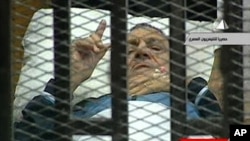Egyptian protesters who ended the presidency of Hosni Mubarak continue to endure one legacy of the past - an all-encompassing emergency law. Unlike Mubarak, who is on trial in a civilian court, thousands of civilians face military tribunals.
The dismantling of Egypt's emergency law has been a key demand of anti-government protesters, and the current military rulers say they are considering its demise.
But human rights groups argue that actions speak louder than words and note that some 10,000 Egyptians have been put before military tribunals in the months since the January uprising. That is more, they say, than during the whole of Mr. Mubarak's 29-year rule.
The government counters that the military courts, which under emergency law are allowed to try civilians, are now used only for common criminals who undermined national security during the political unrest. It is a point adamantly rejected by political activists like Ibrahim El Houdaiby.
"Those are not thugs who are being tried via military tribunals," said El Houdaiby. "Those are our friends, our comrades, our brothers and sisters. People who have been demonstrating on the street. People who have been active and have managed to oust former President Mubarak."
The secretive nature of the military courts makes it hard to know the exact status of each case. Most defendants have no access to lawyers or others on the outside.
Certainly, criminal acts appear to have been committed during the uprising -- an event seen in real time by millions around the world.
But people also witnessed the roundup of political protesters, during raids on Tahrir Square sit-ins in recent months, and at demonstrations outside the Israeli embassy in May.
Political activist El Houdaiby finds the reliance on tribunals for these cases particularly galling, given the treatment of members of the old guard.
"If former president Mubarak, who has allegedly killed over 800 Egyptians, ordered the death of over 800 Egyptians in a few days, not to speak of the 30 years and crimes therein, is now standing in front of a civilian court, it is inconceivable that we would accept civilians standing before a military tribunal," he said.
One activist group, which calls itself "No to Military Tribunals," has met with government officials to demand all civilian cases be moved out of the military, which has lower standards for conviction and blocks the appeal process.
In several cases, the state has obliged. But the vast majority of those arrested remain in the military system, where the detentions themselves give rise to concern.
Human rights groups allege that those held under emergency law face some of the abuses of the former government, in particular beatings and torture. Authorities deny the charges, but defend one controversial practice - the administration of what are called "virginity tests" to female prisoners. Activists decry the practice as a rights violation. Officials say it is to protect security personnel from accusations of rape.
A political science professor of the American University in Cairo, Said Sadek, says the actions of the interim government are not surprising in a time of continuing instability, and show that even after a revolution, political culture is slow to adapt.
"They are still using the old tactics of the old regime in trying to scare people away from taking to the streets," said Sadek. "It will take time before this political culture changes and I think if the emergency laws are lifted and you have an elected parliament, a new constitution, a permanent cabinet, an elected president, the new political system will be more democratic and respecting human rights."
Such a future is, at the very best, months away, leaving many who fought for a new Egypt still suffering the worst excesses of the old.
And activist El Houdaiby says it is not just pro-democracy demonstrators who are affected.
"I have seen them from across the political spectrum. I have seen them from the [Muslim] Brotherhood," he said. "I have seen them from the Gamaa Islamiya and all Islamist factions and even from ordinary Egyptians. I don't want to make this a classification between revolutionists and Egyptians, because we are all civilians at the end of the day and everybody deserves a civilian court."
As for Mr. Mubarak, who appeared in court again Monday on charges that also include corruption, there may be practical reasons he is being treated as a civilian.
"Internationally they do not recognize ruling of military courts, said political analyst Sadek. "And if there is a court ruling that would require the president to bring money from abroad, they need a civilian court ruling."
On the other hand, Sadek argues, it could also be a stalling tactic by the interim government in a politically sensitive case. Civilian cases can be delayed - Mr. Mubarak's is adjourned until September - and the appeals process is lengthy. It is a far cry from the swift and often irrevocable justice handed down by military tribunals.




